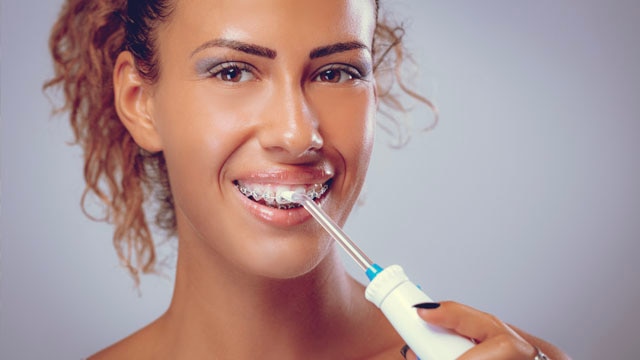-
-

BRUSHING & FLOSSING
How to BrushWhat Is the Right Way to Brush?
Proper brushing takes at least two minutes — that's right, 120 seconds!...

BRUSHING & FLOSSING
How To FlossWhat is the Right Way to Floss?
Proper flossing removes plaque and food particles in places where a toothbrush cannot easily reach... -
Science & Innovation
- Home
- Oral Health
- Electric Flosser - Types, Benefits & More | Colgate®


“Do you floss regularly?” That’s a question everyone has heard, and it usually takes place while you’re sitting in the dental chair. (Head tilted back, mouth wide open...)
Flossing, also referred to as interdental cleaning, is an absolute must for the wellbeing of your overall oral health. Unfortunately though, it’s also an activity people tend to forget or don’t want to do. In this article, we’ll discuss the electric flosser and how it may just be a flossing game-changer for you.
Types of electric flossers
Water flossers and air flossers are the two types of electric flossers available. Both clean between the teeth and around the gumline. The difference between the two is as follows:
- Water flossers - produce a stream of water
- Air flossers - use jets of air containing tiny water droplets
How do electric flossers work?
Both water and air flossers operate with a motor or pump that pushes water into a reservoir. From there, the water goes through the flosser tip. Flossers work by sending steady pulses into the spaces around your teeth. The pressure of the stream loosens and rinses away food particles, debris, and plaque from in between your teeth and around the gum line.
Some battery-operated flossers require you to plug them in to charge. Other flossers need to remain plugged in while in use.
Are electric flossers as effective as traditional floss?
If you struggle with or don’t like traditional flossing by hand, electric flossing could be ideal for you. According to the Australian Dental Association, flossers help “remove plaque and food debris between your teeth and below your gumline”.
Who benefits from electric flossers?
String floss can be tricky, especially if you have braces, dental bridges or arthritis. The ADA says your dentist may recommend an electric flosser to compliment your flossing regimen, so if you have any of the above issues, make sure you discuss electric flossers with your dentist.
Flossing is an essential part of your oral care routine. Cleaning between teeth after each meal or at least once a day, is instrumental in removing plaque and keeping gingivitis and periodontal disease under control. Of course, if you're happy flossing by hand, that’s excellent. Keep it up! However, if you’re not flossing because you find it difficult or don’t enjoy it, consider using an electric flosser. So talk it over with your dental health professional. They can help you find a solution that’s best for you and your oral health.
Related Articles

We know that dairy keeps your bones strong and healthy, but is milk good for your teeth? The answer is a resounding yes, and here's why.

Both crowns and most bridges are fixed prosthetic devices. Unlike removable devices such as dentures, which you can take out and clean daily, crowns and bridges are cemented onto existing teeth or implants, and can only be removed by a dentist.

You take your child to their dental appointment, expecting smiles all around and a clean bill of health.
This article is intended to promote understanding of and knowledge about general oral health topics. It is not intended to be a substitute for professional advice, diagnosis or treatment. Always seek the advice of your dentist or other qualified healthcare provider with any questions you may have regarding a medical condition or treatment.
Related Products

Helping dental professionals
More professionals across the world trust Colgate. Find resources, products, and information to give your patients a healthier future








